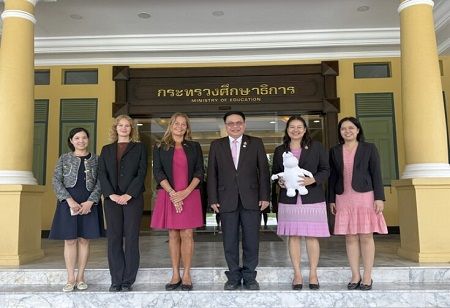- Thailand and Finland held their first Joint Working Group on Education Consultation Meeting in Bangkok under a 2025 MoU.
- Discussions focused on 8 key projects, including teacher training, vocational education, AI/robotics learning, and Finland-inspired methods.
- Both nations pledged structured cooperation, aiming to implement long-term, practical reforms in their education systems.
Thailand and Finland are deepening their educational connections as part of an increasing bilateral cooperation under a Memorandum of Understanding entered into earlier this year between the two countries' ministries of education. The first Thailand-Finland Joint Working Group on Education Consultation Meeting took place at the Ministry of Education in Bangkok. The session was presided over by Mr. Pichet Phophakdee, Deputy Permanent Secretary of the Thai Ministry of Education, and included Dr. Annika Vatanen, Education Advisor of the Embassy of Finland in Thailand, and representatives of some Thai education authorities.
This session was a crucial step towards the progress of eight priority projects listed under the MoU signed in February 2025 at Royal Princess Larn Luang Hotel. The objective was to create a strategic plan for collaboration and facilitate viable planning, budgeting, and implementation processes. The projects cover a diverse set of priorities ranging from arranging a Thailand-Finland Education Seminar to improving early childhood education and enhancing teachers' training with a special emphasis on phenomenon-based learning. Additional efforts involve promoting strategic education exchanges, enhancing vocational skills training, and strengthening training of teachers in new areas like robotics, programming, and artificial intelligence.
Also Read: Singapore to Hire 1,000 Teachers Annually, Education Minister Announces
The discussions also stressed the need for adult learning and lifelong education, as well as the incorporation of Finnish school practice, especially in the science, technology, engineering, and mathematics fields, into Thai teacher development programs. The Thai side valued Finland's persistent interest and its image of top-class education excellence, noting the benefits of such cooperation for both sides. Mr. Pichet reaffirmed Thailand's desire to develop a solid and long-lasting partnership with Finland in the education sector.
The Finnish side reacted positively, expressing strong endorsement of all the suggested initiatives. Both parties concurred on the necessity of an organized method for undertaking the projects, with defined roles for involved agencies and efficient monitoring and evaluation mechanisms in place. The session ended with a common determination to convert plans into action and enhance cooperation through pragmatic, long-term initiatives that make significant contributions to the education systems of both countries.

